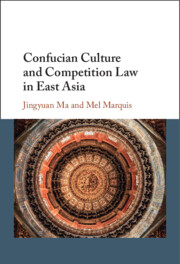Book contents
- Confucian Culture and Competition Law in East Asia
- Confucian Culture and Competition Law in East Asia
- Copyright page
- Contents
- Preface
- Abbreviations
- 1 Introduction
- 2 Confucian Culture and Its Influence in East Asia
- 3 Confucian Business Culture and Its Implications for Competition Law
- 4 Confucian Corporate Culture and Competition Compliance
- 5 Confucian Political-Bureaucratic Culture and Its Links with the Administrative Enforcement of Competition Law
- 6 Confucian ‘Litigation Culture’ and the Under-development of Private Antitrust Enforcement
- 7 Confucian Legal Culture and the Regional Response to the Criminalization of Cartel Conduct
- 8 Conclusion
- Selected Bibliography
- Index
6 - Confucian ‘Litigation Culture’ and the Under-development of Private Antitrust Enforcement
Published online by Cambridge University Press: 01 September 2022
- Confucian Culture and Competition Law in East Asia
- Confucian Culture and Competition Law in East Asia
- Copyright page
- Contents
- Preface
- Abbreviations
- 1 Introduction
- 2 Confucian Culture and Its Influence in East Asia
- 3 Confucian Business Culture and Its Implications for Competition Law
- 4 Confucian Corporate Culture and Competition Compliance
- 5 Confucian Political-Bureaucratic Culture and Its Links with the Administrative Enforcement of Competition Law
- 6 Confucian ‘Litigation Culture’ and the Under-development of Private Antitrust Enforcement
- 7 Confucian Legal Culture and the Regional Response to the Criminalization of Cartel Conduct
- 8 Conclusion
- Selected Bibliography
- Index
Summary
Chapter 6 turns to the subject of 'private enforcement', which in East Asia is uneven and inadequate. It discusses this through the lens of ‘litigation culture’, or rather the culture of non-litigiousness. Claims of non-litigiousness in East Asia, and above all in Japan, have been fiercely contested by scholars. Yet the subject is nuanced; the impact of non-adversarialism has not simply been ‘debunked’. In the context of this debate, the chapter examines factors that have limited the development of consumer antitrust claims. Consistent with the value of social harmony and the ancient authoritarianism that prioritizes social stability, methods of mediation and conciliation have been favoured over court conflict. Under the influence of this tradition, private parties have often been encouraged to settle their differences. Deviating from this tradition, the chapter highlights Korea, where recent legislative developments are producing, at least on paper, stronger litigation incentives. Overall, the view is expressed that, where cultural factors contribute to non-adversarialism, thereby leading to a deficit in the vindication of private claims, it appears that cultural messaging and a shift in norms may assist in unlocking the potential of legal and procedural reforms that reduce institutional barriers and activate economic incentives.
Keywords
- Type
- Chapter
- Information
- Confucian Culture and Competition Law in East Asia , pp. 199 - 289Publisher: Cambridge University PressPrint publication year: 2022



